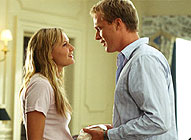|
|
|
|
Wimbledon
|
 |
|
Wimbledon is a busy, fast-paced comedy that makes good use of every device in the arsenal of the sports movie. The clash of American and British manners, the media carnival of reporters and commentators, the superstitions that unhinge players, the money-hungry agents, the uneasy relationship between performance on the court and in the bedroom – it's all here. The Working Title company tends to make films (such as Notting Hill, 1999) to formulas – especially its own formula for romantic comedy, honed since the days of Four Weddings and a Funeral (1994). The growth in the company's commercial success has inevitably led it away from a strictly British sensibility and towards more globalised entertainments, with mixed results. But what better arena for globalised entertainment than Wimbledon? Here, director Richard Loncraine (Richard III, 1995) and his writers give the Working Title formula a decent shake-up. The cast – passably coached by consulting tennis experts – is certainly up for the task. Peter (Paul Bettany) is an ageing, British tennis player set to play his last year at Wimbledon. No one can ever quite remember correctly that he was once rated eleventh in the world, and now he faces the rather grim prospect of coaching the elderly at a resort. Lizzie (Kirsten Dunst), on the other hand, is the new, rising star. Her all-American, showy temperament is controlled only by the stern presence of her father, Dennis (Sam Neill). Naturally, since everything seems set up as an obstacle against it, Peter and Lizzie become secretly involved. His game starts to improve, while hers starts to falter. Incredibly, Peter finds himself successfully working his way through the matches, contemplating a shot at the big prize. But can love survive sporting competitiveness, the media glare, and several sinister, external influences wielded by the corporate tennis world? Like the John Hughes teen comedies of the '80s, Wimbledon uses its speed and style to glide swiftly past some knotty or underdeveloped ideas in the script. Issues relating to Peter and Lizzie's sexual intimacy – such as whether he is just using her as an enhancement to his game – are glossed over. Some of the flip-flop conversions in the psychology of minor characters tend to occur too rapidly and slightly unconvincingly. Some lazy traces of typical Working Title touches do linger. It is customary, for example, for this company's films to contrast a story's glamorous main characters with a bunch of vulgar secondary characters. Peter's sex-starved brother (James McAvoy), pulling birds on the basis of a little borrowed fame, fills that bill here. But, to compensate, Loncraine does something more satisfying with the role of Dieter (Nikolaj Coster-Walder), Peter's practice partner, who retains his dignity even though he is far from sports stardom. A similar respect is accorded by the film to Peter's parents, played superbly by Eleanor Bron and Bernard Hill. At first they seem like stock characters: the haughty, dissatisfied Mum and the grumpy Dad off watching the telly in his lonely tree-house. Where the film subsequently takes them is both amusing and very touching. As even this brief discussion indicates, Wimbledon is a film that manages to pack in a lot of characters, moods and incidents. Best of all, although it skips through a sequence of truncated games for most of the plot, when it comes down to the final match we get a wonderfully thrilling, ball-by-ball recreation of the key moves, upsets and breakthroughs. It is hard not be won over by this film's slick but smiling manipulations. MORE Curtis/Working Title: Bridget Jones's Diary, Bridget Jones: The Edge of Reason © Adrian Martin September 2004 |
![]()